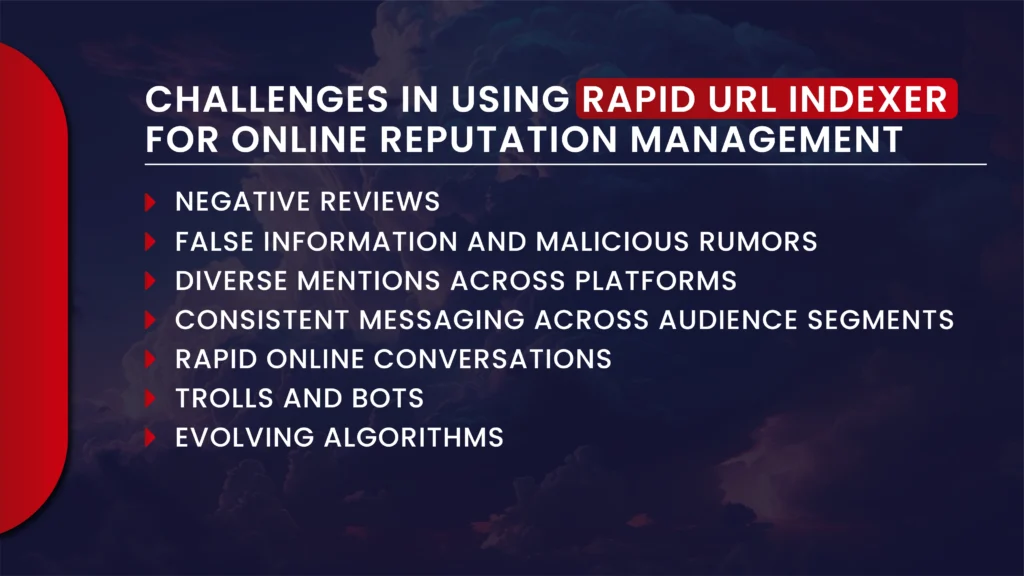If you’ve searched your name or business on Google and found bad results at the top, you’re not alone. The good news? You can fix your online name fast using online reputation management (ORM) and a smart tool called Rapid URL Indexer. It helps push good pages up and old or negative stuff down. Here’s how.
What Is Online Reputation Management?
Online Reputation Management (ORM) is the process of improving how people see you online. It involves removing or hiding bad content, posting good content, and making sure that what shows up on search engines like Google presents you or your brand in a positive way.
Think of your reputation like your personal report card. When someone types your name into Google, the results should show good grades — like your achievements, positive reviews, and helpful content. ORM makes sure the good things about you are easier to find and the bad things are harder to see.
For example, if you had a bad review or old news story online, ORM helps create newer, better content so that people searching for you see the updated, positive side instead of outdated or negative info.
Why Google Shows Old or Bad Stuff First
Google’s job is to give searchers the most “relevant” content. But that doesn’t always mean the “best” content — especially when it comes to personal or business reputations.
If a page gets a lot of traffic, has been online for years, or is hosted on a trusted site like a news website, it might show up first. That means old news articles, bad reviews, or outdated blog posts can rank high — even if they’re no longer true or helpful.
Google doesn’t know what’s fair or current — it just sees what’s popular and authoritative. That’s why even one bad page can stick around for years. To fix this, you need new, high-quality content that Google can find quickly — and this is where Rapid URL Indexer helps.
What Does a URL Indexer Do?
A URL indexer is a tool that tells Google and other search engines about a new or updated web page. If you post something online, it won’t appear in search results right away. Sometimes it can take days, weeks, or even months before Google notices it.

A URL indexer speeds up this process. It “pings” Google and says, “Hey! There’s something new here. Come look!” This way, your content gets seen and ranked faster.
So if you’ve created a new blog post, a social media profile, or a business page that shows you in a good light, a URL indexer helps that page show up in search engines quickly — which is super important for online reputation management.
How Fast Indexing Helps You Look Better
When you’re trying to clean up your online reputation, speed matters. The faster your new, positive content shows up in Google, the faster it can push down the bad stuff. Think of it like planting flowers to cover up a weed. If you wait too long, the weed keeps growing.
By using a fast indexing tool like Rapid URL Indexer, your good pages can rank in search engines within hours or days — instead of weeks. That’s a huge advantage when you’re trying to improve your online name fast.
What Is Rapid URL Indexer?
Rapid URL Indexer is a tool that helps search engines find and index your web pages quickly. It sends your URLs directly to services like Google Indexing API, and other fast-track indexing sources. It’s built for speed and designed to help people and businesses manage how they look online.
It’s perfect for people trying to:
- Bury bad reviews
- Get new job opportunities
- Control what potential clients see
- Clear up outdated or negative stories
Rapid URL Indexer is user-friendly, fast, and built for results.
Why Use It for Your Online Reputation?
When bad things show up first on Google, it can hurt your business, job chances, or personal life. But creating good content isn’t enough — it needs to be seen fast.
Here’s why Rapid URL Indexer is ideal:
- It speeds up the process of showing your positive pages in search results.
- It helps Google notice new content that shows the real you.
- It gives you control over what shows up first when people search your name.
- It works great with social profiles, blogs, articles, and press releases.
In short, it helps you look better online — faster.
How to Use Rapid URL Indexer Step-by-Step
Using Rapid URL Indexer is simple. Here’s a step-by-step guide to get your good content noticed:
- Create a positive piece of content — like a new LinkedIn profile, blog post, video, or news article.
- Make sure the page is live and publicly viewable online.
- Copy the full URL (link) of your new page.
- Paste it into Rapid URL Indexer.
- Hit the submit button and let the tool do the rest.
Within a short time, your link will be indexed and ready to start appearing in search results.
Make Good Pages
To manage your online reputation well, you need high-quality pages that make you look great. Google likes content that’s:
- Useful
- Unique
- Updated
- Clear
Here are some ideas:
- Write a blog post about your skills or success story.
- Create a profile on platforms like LinkedIn, Medium, Crunchbase, or Quora.
- Get mentioned on local news or business websites.
- Post helpful YouTube videos with your name or brand.
- Use social media to your advantage — but keep it professional.
The more great content you create, the more good stuff Google has to show.
Copy the Page URL
Once your good page is ready, the next step is simple: copy the link.

Click on your new page, go to the address bar, and copy the full URL. For example:
arduino
CopyEdit
This is the link you’ll submit to Rapid URL Indexer.
Paste Into Rapid URL Indexer
Open Rapid URL Indexer, and you’ll see a box where you can paste the URL. Drop the link there and click “submit.”
That’s it! The tool will send your page to Google’s indexing system right away. No waiting for weeks — your page will be indexed much faster.
Good Content Ideas to Show the Real You
The key to success is showing who you really are — not just hiding the bad stuff. Here are smart content ideas to use:
- Positive news articles about your achievements
- Interviews or podcasts you’ve been part of
- Helpful guides or how-to blogs on your industry
- Client testimonials or reviews
- Educational YouTube videos
- Professional social media bios
Try to include your name or brand naturally in the text and titles. This helps Google connect the page with you.
Where to Share Your Good Pages
Getting indexed is step one. Step two? Share your good pages across the internet. This adds authority, trust, and more traffic — which makes them rank higher.
Great places to share:
- Social media platforms (Facebook, Twitter/X, LinkedIn)
- Forums like Reddit or Quora
- Email newsletters
- Comment sections on other blogs (be respectful)
- Community websites or local directories
The more your link is shared and clicked, the more valuable it looks to Google.
More Tools to Help Clean Your Online Image
Rapid URL Indexer is amazing, but it’s even more powerful when used with other tools. Here are some SEO tools that can help:
- Ahrefs – to find bad backlinks or monitor your name
- SEMrush – to research keywords and track rankings
- Google Search Console – to monitor what Google sees about you
- Canva – for designing great visuals for your content
- Grammarly – for perfect spelling and grammar
Use these tools to create, optimize, and promote your best online self.
The Bottom Line
Your online reputation is important — but you don’t have to let old or bad search results define you. With smart strategies and tools like Rapid URL Indexer, you can take back control.
Here’s what you need to remember:
- Google shows what it knows — so help it find your best content.
- Create new, positive pages that reflect who you are today.
- Use Rapid URL Indexer to speed up how fast those pages get found.
- Keep creating and sharing content to stay ahead.
It’s not magic — it’s smart, fast, and easy-to-follow reputation repair. Whether you’re a business, a professional, or just someone trying to clean up their digital name, you’ve got the power to make it happen.


